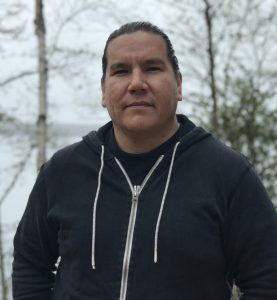About Moon of the Crusted Snow
About the Novel
Moon of the Crusted Snow by Waubgeshig Rice is a fictional novel that looks at how an Anishinaabe First Nation in northern Ontario deals with an unknown event that leaves the community isolated, without power or phone service and with limited food sources as winter sets in.
In 2018, Dr. Anna Rodrigues approached author Waubgeshig Rice with the idea of collaborating on an open educational guide for his novel, Moon of the Crusted Snow, when she discovered that OERs for books written by Indigenous authors were lacking. That collaboration resulted in an online educational guide launching in 2019 that was well received by educators across Canada. In early 2021, Waubgeshig and Anna decided to update the guide and, at that time, Dr. Kaitlyn Watson, from the Teaching and Learning Centre at Ontario Tech University, joined the project. As part of this update, themes from the original resource have been expanded and a new theme, which explores connections between the novel and the global pandemic, has been added.
In December 2018, Waubgeshig Rice sat down with Shelagh Rogers from The Next Chapter [New Tab] to discuss his recently published book, Moon of the Crusted Snow. The Next Chapter [New Tab] is a Canadian Broadcast Corporation (CBC) radio program focused on Canadian writers and songwriters.
Author’s Bio

Waubgeshig Rice is an author and journalist from Wasauksing First Nation on Georgian Bay. His first short story collection, Midnight Sweatlodge, was inspired by his experiences growing up in an Anishinaabe community and won an Independent Publishers Book Award in 2012. His debut novel, Legacy, followed in 2014, with a French translation published in 2017. His latest novel, Moon of the Crusted Snow, became a national bestseller and received widespread critical acclaim, including the Evergreen Award in 2019. His short stories and essays have been published in numerous anthologies.
His journalism experience began in 1996 as an exchange student in northern Germany, writing articles about being an Indigenous youth in a foreign country for newspapers back in Canada. He graduated from Ryerson University’s journalism program in 2002. He spent most of his journalism career with the Canadian Broadcasting Corporation as a video journalist, web writer, producer and radio host. In 2014, he received the Anishinabek Nation’s Debwewin Citation for excellence in First Nation Storytelling. His final role with CBC was host of Up North, the afternoon radio program for northern Ontario. He left daily journalism in 2020 to focus on his literary career.
He currently lives in Sudbury, Ontario with his wife and two sons, where he’s working on the sequel to Moon of the Crusted Snow. Please visit Waubgeshig Rice’s website [New Tab] to learn more about him.
Watch It: Learn More About Indigenous Cultures
Use the interactive slides below to watch the videos on Indigenous Cultures.
Learn More About Indigenous Culture Videos (Text Version)
Watch The last fishermen: ‘You can’t quit if the weather gets bad or cold or if there’s no fish’ (22 minutes) on YouTube
Watch The power of a tree: Why birch and its bark are so important (22 minutes) on YouTube
Watch Traditional Indigenous smudging (2 minutes) on YouTube
Watch Traditional medicines with Joseph Pitawanakwat (2 minutes) on YouTube
Activity Source: “Learn More About Indigenous Culture” H5P activity created by oeratgc, licensed under CC BY-NC-SA 4.0, except where otherwise noted.
Read the Moon of the Crusted Snow:
Georgian Students can access the full novel, Moon of the Crusted Snow [New Tab], via the Library database.
If you are prompted to login, use the same Georgian credentials as you do for Blackboard or your student email.
Reflection Questions
- Before reading the book, Moon of the Crusted Snow, you reflect on what land-based knowledge means to you. Ask this question again after reading the book. How has your understanding of land-based knowledge changed?
- Do you feel connected to the land around you? Does the environment sustain you in some way (mentally, physically, emotionally, spiritually)? What connection do you have with your specific environment, and would you change anything?
- How do you think the physical environment affects the community and the culture of the people living there in both large and small ways (think daily life as well as larger events)? Consider Canada and its varied landscape in comparison to other countries. How is a person’s life experience affected by the surrounding conditions?
Summary
Attribution & References
Except where otherwise noted, this chapter is adapted from “Moon of the crusted snow: Reading guide” and “Land” In Moon of the crusted snow: Reading guide by Anna Rodrigues and Kaitlyn Watson, licensed under CC BY-NC-SA 4.0/Adaptations include changing the photo of the author Waubgeshig Rice, addition of YouTube videos and reflection questions.
- Content from “Reflection Questions” section is from “Discussion Questions” section in “Land” In Moon of the crusted snow: Reading guide by Anna Rodrigues and Kaitlyn Watson, licensed under CC BY-NC-SA 4.0/ Adaptations include addition of fourth question.
References
CBC Docs. (2021, March 19). The power of a tree: why birch and its bark are so important to Anishinaabe culture [Video]. YouTube. https://youtu.be/mQE4g35nRRk
CBC Docs. (2021, March 23). The Last Fishermen: ‘You can’t quit if the weather gets bad or cold or if there’s no fish’ [Video]. YouTube. https://youtu.be/U7zdeMPARI0
DC Broadcasting. (2018, December 3). Traditional Medicines with Joseph Pitawanakwat [Video]. YouTube. https://youtu.be/ch8iJdqsWTQ
Trent University. (2019, August 19). Traditional Indigenous smudging [Video]. YouTube. https://youtu.be/Z4UoIyHKExk

